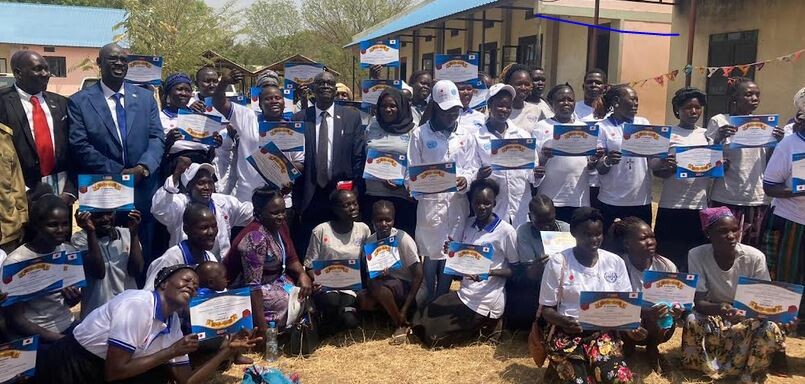The Government of Japan through its embassy in Juba on Tuesday completed a one-year project to economically empower newly arrived female Internally Displaced Persons (IDPs).
The project benefited about 80 women IDPs and members of the host communities at the Salesians of Don Bosco`s Mazzarello Multipurpose Cooperative Society located in Gumbo in Juba.
The women gained skills to generate income for their families through workshops on Entrepreneurial Development Programmes (EDP), and Village Savings and Loan Association’s Savings (VSLS) groups that were funded by the Government of Japan and implemented by the Universal Intervention and Development Organization (UNIDO).
Speaking during the closing ceremony of the project, Watanabe Tomoko, the Deputy Chief of Mission of the Japanese Embassy in South Sudan, said though the amount and number of targeted people may be small, now is the time for the IDPs to stand up and provide training to other IDPs and host community women to expand their businesses at Rejaf Payam, Juba County, in Central Equatoria State.
“Japan will continue to provide support for the efforts of self-sustainment of the South Sudanese people and help the lives of the most vulnerable people including women and children,” Tomoko said. “Japan’s efforts in supporting South Sudan’s effort for durable peace and nation building will continue.”
For her part, Jenifer Apieu Bukanyi, the chairperson of Mazzarello Multipurpose Cooperative Society, a beneficiary of the project, said the project has helped the women acquire knowledge and skills in entrepreneurship, how to start a business, and manage it.
“We are going to continue because we already started saving last year and it will continue for nine months until November. These savings will be the one to maintain us,” she stated. “They have also given each group startup capital including groundnuts and sesame and bottles for packaging the oil that we produce for sale.”
Apieu said they will price their products according to their expenses and prevailing market prices.
Meanwhile, Florence Mura Albano, another beneficiary of the project, said the skills she learned will help her become self-reliant.
“I benefited a lot. I have been doing my business but I did not know how to manage my business but through this training, I learned how to manage my business,” she said. “We have been cooking but we did not know anything about food safety but through the training, I know the right things to do and how to handle food. I even learned how to plant crops.”
Speaking at the function, Kuorwel Kaui Kuorwel, the chairperson of the South Sudan National Bureau of Standard (SSNBS), said they have been ensuring that the products made by the women conform to the safety standards.
“The SSNBS was involved right from day one to make sure that the products that are being produced here by these women like the oil which is produced from sesame peanut butter are following the standards,” he revealed. “What they produce here should be accepted in different markets in Juba and they should be able to make a living out of what they produce. We make sure they maintain quality and safety standards so that they meet the standards for human consumption.”
The Japanese-funded Women Empowerment Project at Don Bosco Center supported 80 women including IDPs from Eastern Equatoria and host communities to ensure food security and peace consolidation through training women and providing equipment.
The center had several activities including, catering, agriculture, tailoring, and a processing department in which a local non-governmental organization, Universal Intervention and Development Organization (UNIDO), supported the women with training on Village Savings and Loans Associations, oil processing, making peanut butter and training in food safety.




